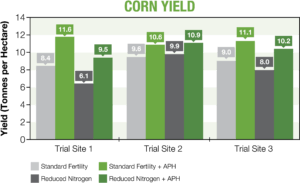
Trust Us, It Works. Why Biostimulant Companies Can No Longer Say This
When it comes to farming, investing in something new often faces harsh criticism. There’s good reason for this. Taking a chance in agricultural practices isn’t a small ask. In some areas of the world, a farmer has one chance a year to get the best harvest they can get. Over the lifetime of a farmer that can mean just forty chances. Forty chances to plan your crop, adjust to what mother nature throws at you and hope for the best. You can see why a farmer would be skeptical to change up their products or their practices. So, when it comes to selling products to farmers, they need to see real results. Something the agribusiness industry is quite familiar with, and invests heavily in, to ensure they provide just that.
Farmers don’t buy products, they buy outcomes.
This is where the biostimulant industry has faltered. There have been far too many companies that have made outrageous claims on products with no efficacy data to substantiate them. This creates a challenge with speculative information and unproven products. To the point where some in the ag industry have avoided the realm of biostimulant solutions altogether. Yet the need for sustainable solutions in agriculture continues to grow and biostimulants are products that can deliver.
This is where a shift is starting to happen at Acadian Plant Health, a seaweed extract biostimulant company. “We have a very strong base of scientific data within the company. Forty years’ worth actually. Most of which has been peer-reviewed and even published in scientific journals” says James Maude, SVP at Acadian Plant Health. “But what we needed to show was the efficacy of our product in ways that truly mattered to growers, and the industry. We’re very focused on partnering with agribusiness companies. We believe for farming to evolve, it’s essential that we work hand-in-hand with these companies. It’s not all or nothing. Biostimulants aren’t a solution for everything, and neither is conventional agriculture. Putting these together can really put agriculture, as a whole, on an incredible path.”
With a large component of Acadian’s leadership team coming from global agribusiness, they knew replicated trials and proven ROI was essential to developing trust. “A recent example of where our data matters is around fertilizer efficacy. Growers are struggling right now with prices, and we know we’ve done many trials that have shown you’re gaining more efficiency out of that fertilizer when you add our seaweed extract.”
In a time when fertilizer prices are almost double, seeing these results even in reduced fertilizer situations, can really be a game changer for the industry. “Where things get real is when you start to calculate the ROI on these trials,” says James. “Take a corn crop for example. The average cost in 2022 is coming in at $400/acre. Calculate this against our reduced rate of fertilizer at 30% plus the cost of our product and you can see a vast difference in cost – and yet the same yield.”


There’s more at play than just crop yield
The numbers certainly paint an interesting picture, but the story behind the efficacy of adding Acadian’s seaweed extract is the most telling. Biostimulants are well-known for their ability to help with abiotic stressors, but their affect on soil health and root development is what’s at play here. “Our studies have shown an increase in microbial abundance and activity around the root of the plant, supporting microbiome establishment. This is key to improving nutrient uptake and ensuring the nutrients available are being used,” says James.
“As a fertilizer company this could be a real differentiator. There is an opportunity to consider what adding biostimulants like ours to the mix can do for their business. It can really take a company’s offering from just a commodity to a commodity plus, with benefits like soil health and nutrient use efficiency mixed into the equation.”
With new regulations coming into play, like the EU Green Deal goal to reduce synthetic chemicals by 50% and fertilizers by 20% by 2030, there are fears from the industry that a probable consequence will be yields of agriculture crops will decline. “If you consider the increase in nutrient uptake we’ve seen in plants when our product is added, even with a 30% reduction of fertilizer and still no yield impact, the mix of our seaweed extracts into fertilizer programs could be the solution the industry needs. If a fertilizer company can help a farmer meet the EU goals and yet still provide the yield they need from a fertilizer program, then they’re really going to win when it comes to meeting these social and political objectives,” says James.
From Acadian’s standpoint, they’re focused on investing in sustainable solutions, steadily adding new technologies into their research and development pipeline. One thing remains clear for the company. “We’re committed to delivering solutions that perform where it matters most – in the field.”
Interested to learn more about our seaweed extracts? Read about our innovations here or contact us with any questions.